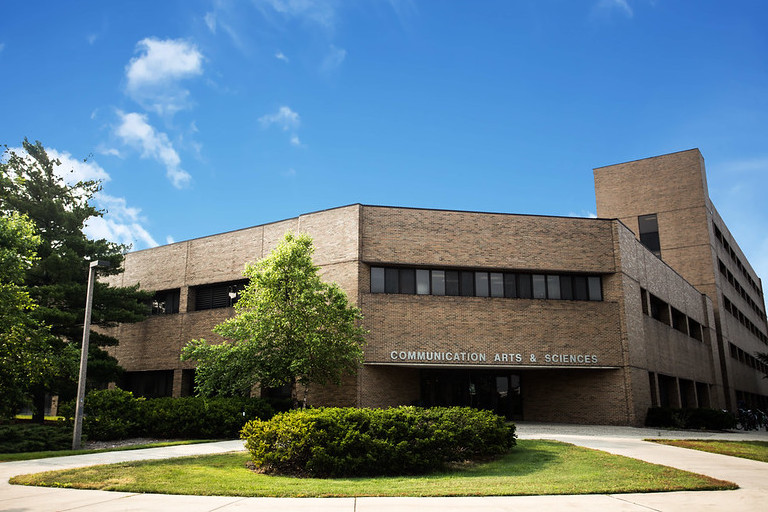Two faculty members have been honored with the 2021 ComArtSci Brandt Fellowship for Faculty Excellence, Sports Journalist in Residence Joanne C. Gerstner and Professor Wei Peng, Ph.D.
The one-year fellowship recognizes excellence in research, scholarship or creative work by faculty in MSU’s College of Communication Arts and Sciences. All full-time faculty members in ComArtSci are eligible for the $25,000 award, which can be used to strengthen ongoing activities in a particular domain or to build a new area of interest.
During the application process, the Awards Committee considered faculty for national or international accomplishment in teaching, research, creative work, professional accomplishment, and outreach or service. In addition to past accomplishments, the judges considered the future potential of the honoree.
“All the faculty who applied have impressive qualities and are worthy of recognition in their areas,” said Professor Eric Hunter, Ph.D., the Associate Dean for Research at ComArtSci. “They represent a cross-section of ComArtSci faculty who have made important impacts with their work.”
ComArtSci is proud to present the 2021 Brandt Fellowship for Faculty Excellence honorees.

Joanne C. Gerstner
Sports Journalist in Residence Joanne C. Gerstner has taught at the MSU School of Journalism for more than six years, bringing experience as a sports journalist, sports neurology researcher, author and expert. She was the first sports journalist to keynote at the Big Ten-Ivy League Concussion Symposium in 2019. She wrote the 2017 Clarion Award-winning book, Back in the Game, one of the first significant global discussions about concussions and youth sports for coaches and parents. Her expert ability to discuss translational science, neurology, media and sports has brought opportunities to increase the understanding of sports impacts around the world. She has also served as a long-standing change agent and a leading voice for female journalists, advocating to increase the number of women in the media.
Receiving many honors for her ground-breaking work, Gerstner became the first female sportswriter to be selected for the Michigan Journalism Hall of Fame in 2021. Previously, she received Oakland University’s 2020 Distinguished Alumni Achievement award (as the first sports journalist ever); and was named the Association for Women in Communications Detroit Headliner of the Year in 2017. She also received the ComArtSci Faculty Impact Award and the ASMSU Faculty of the Year Award for teaching and mentoring excellence in 2017. In addition, she earned Fulbright Specialist status in 2019-2023 for Journalism, Women’s Leadership and Sports Media.
Gerstner’s research on concussions leads her to give many speeches to national groups, from parent sports associations to the American Academy of Neurology, and to make frequent expert appearances on podcasts and TV shows. She has published articles in The New York Times, NPR, Hour Magazine, U.S. Olympic and Paralympic Committee’s media arrays. She leads the MSU Journalism Specialization for Coursera, a global online education platform.
Gerstner was appointed by Gov. Gretchen Whitmer to serve a three-year term as a Commissioner on the State of Michigan’s Women in Sports Task Force. The group is charged with examining and improving athletic opportunities for females of all ages. She also serves on the Headway Foundation board, an international concussion resource nonprofit. She frequently gives her time as a reviewer or judge for international academic journals and professional journalism organizations.
Gerstner serves as co-mentor for the award-winning MSU Association for Women in Sports Media student chapter; and she mentors MSU Sports Journalism students, young professionals and women around the country. She strives to connect her students with diverse career networks. She is the chair of the Journalism Communications Committee. She frequently appears as an expert in the media on sports and diversity, equity and inclusion.

Wei Peng
Media and Information Professor Wei Peng, Ph.D., has worked at MSU for 15 years. At MSU, she has served on 16 different department, college, and university committees, often serving two or more terms. Outside MSU, she has served as a guest editor, associate editor, and editorial board member for nine journals and co-chaired the 2012 Meaningful Play Conference. She has also been sought multiple times by program officers from the National Institutes of Health (NIH) to review grant submissions. She has secured over $1 million in grants as a principal investigator or co-principal investigator to support her research.
Her health intervention projects have a significant outreach component. She worked with Type II diabetes patients from Hayes Green Beach AL!VE in Charlotte, Michigan, to teach them how to use mobile apps for self-management. Her Olympus active video game helped insufficiently active students at MSU to increase their physical activity. With internal grants, she collaborated to develop a pilot intervention program for using wearable activity trackers to help senior adults in the community increase their physical activity.
Peng is an advocate of student-centered active learning and team-based collaborative learning. She uses technological tools and her research on gamification to increase engagement and motivation. She was among the pioneers at MSU to experiment with innovative classroom designs to facilitate engaged and active learning called Rooms for Engaged and Active Learning (REAL). She is also an active mentor for students in both master’s and doctorate programs, and she earned the prestigious MSU Teacher-Scholar Award in 2014.
Integrating the research traditions of media psychology and health communication, Peng’s research seeks to understand the psychological mechanisms of behavior change mediated by information and communication technology and aims to inform the design of interactive media for health and wellness promotion. By identifying the underlying mechanisms of the effects of interactive media as well as the moderators that affect the direction or strength of the effects, she attempts to theorize how digital games, social media, mobile apps, and conversational agents produce changes in individuals, and generalize principles to design health interventions for positive change.
Her research is widely cited and three of her articles received enough citations to be ranked in the top 1% of the academic field of Social Sciences according to Clarivate Analytics InCites Essential Science. She draws on her insights into the design and development of digital games and social media to help individuals eat healthier and exercise more, which has significant implications for improving public health.
By Melissa Priebe
